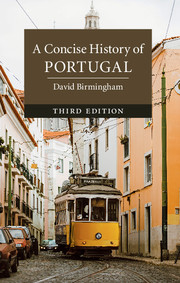Book contents
- Frontmatter
- Dedication
- Contents
- List of illustrations
- Preface to the third edition
- Map1
- Introduction
- Map2
- 1 Peoples, cultures and colonies
- 2 Rebellion and independence in the seventeenth century
- 3 The golden age and the earthquake in the eighteenth century
- 4 Brazilian independence and the Portuguese Revolution
- 5 The bourgeois monarchy and the republicans
- 6 The dictatorship and the African empire
- 7 Democracy and the European Community
- Afterword: entering the twenty-first century
- The houses of Avis, Beja and Habsburg
- The houses of Braganza and Braganza-Saxe-Coburg
- Republican presidents
- Select source materials
- Selected works published since 1990
- Further reading in English
- Index
2 - Rebellion and independence in the seventeenth century
Published online by Cambridge University Press: 28 March 2018
- Frontmatter
- Dedication
- Contents
- List of illustrations
- Preface to the third edition
- Map1
- Introduction
- Map2
- 1 Peoples, cultures and colonies
- 2 Rebellion and independence in the seventeenth century
- 3 The golden age and the earthquake in the eighteenth century
- 4 Brazilian independence and the Portuguese Revolution
- 5 The bourgeois monarchy and the republicans
- 6 The dictatorship and the African empire
- 7 Democracy and the European Community
- Afterword: entering the twenty-first century
- The houses of Avis, Beja and Habsburg
- The houses of Braganza and Braganza-Saxe-Coburg
- Republican presidents
- Select source materials
- Selected works published since 1990
- Further reading in English
- Index
Summary
The revolt of the Portuguese began on 1 December 1640. The attack on the union crown of Spain and Portugal came unexpectedly. In the early years of union the crown had been careful not to impose inappropriate burdens on the Portuguese kingdom in order to meet the needs of the Spanish one. By 1640, however, such niceties had been eroded and the military needs of Spain required urgent action. The kingdom of Catalonia, long since joined to the crown of Castile on the far side of Iberia, had rebelled against the Spanish union in June of 1640. Castile immediately demanded that Portuguese conscripts be recruited and marched across the peninsula to put down the Catalan insurrection in the east. The great landowners of the plains of Portugal particularly resented new military levies imposed by the union crown in Madrid. Some refused to mobilise their scarce fieldhands for armed service and to surrender them to Spain for such a campaign. The protesters encouraged their premier duke, John of Braganza, to declare Portuguese independence and so free them permanently from such Castilian impositions. They argued that Spain would not be able to mount repression on two fronts and that a Portuguese rebellion was therefore likely to succeed so long as they struck their blow for freedom while the Catalans were still in revolt. The Braganzas, at their noble seat between Evora city and the Castilian frontier, vacillated. Duke John recognised that should the plot fail he had more lands to lose than any other Portuguese duke. Eventually, however, he agreed to lead the insurrection and to lend the name of his house to an insurgent dynasty. The rebels thereupon invaded the royal palace in Lisbon and expelled the resident representative of the Spanish Habsburgs.
The Braganza insurrection was not, by inception, a popular revolution. Three years earlier, in 1637, a genuinely grass-roots rebellion had been attempted in Portugal. On that occasion it was the peasants who had protested at the level of taxation which the union with Spain imposed upon them. Their cause, however, had not been supported by the landowners who had feared that any popular rebellion might jeopardise their own status and privilege.
- Type
- Chapter
- Information
- A Concise History of Portugal , pp. 35 - 66Publisher: Cambridge University PressPrint publication year: 2018

